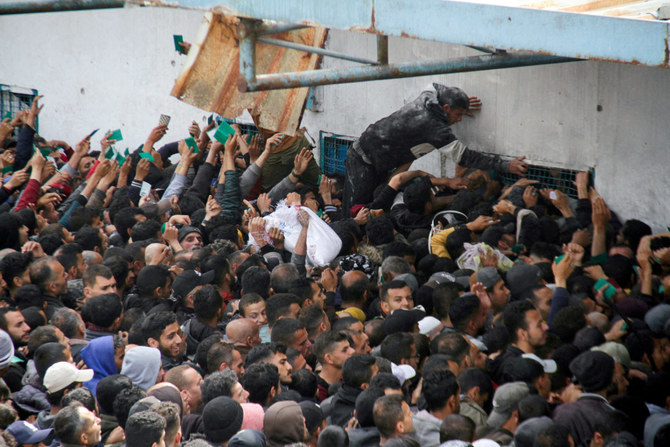WASHINGTON: The UN World Food Programme has agreed to help deliver aid for the starving civilians of Gaza once the US military completes a pier for transporting the humanitarian assistance by sea, US officials said Friday.
The involvement of the UN agency could help resolve one of the major obstacles facing the US-planned project — the reluctance of aid groups to handle on-the-ground distribution of food and other badly needed goods in Gaza absent significant changes by Israel.
An Israeli military attack April 1 that killed seven aid workers from the World Central Kitchen intensified international criticism of Israel for failing to provide security for humanitarian workers or allow adequate amounts of aid across its land borders.
President Joe Biden, himself facing criticism over the humanitarian crisis in Gaza while supporting Israel’s military campaign against Hamas, announced March 8 that the US military would build the temporary pier and causeway, as an alternative to the land routes.
The US Agency for International Development confirmed to The Associated Press that it would partner with the WFP on delivering humanitarian assistance to Gaza via the maritime corridor.
“This is a complex operation that requires coordination between many partners, and our conversations are ongoing. Throughout Gaza, the safety and security of humanitarian actors is critical to the delivery of assistance, and we continue to advocate for measures that will give humanitarians greater assurances,” USAID said in its statement to the AP.
US and WFP officials were working on how to deliver the aid to Palestinian civilians “in an independent, neutral, and impartial manner,” the agency said.
There was no immediate comment from the WFP, and an WFP spokesperson did not immediately return a request for comment.
Israel promised to open more border crossings into Gaza and increase the flow of aid after its drone strikes killed the seven aid workers, who were delivering food into the Palestinian territory.

The war was sparked when Hamas militants attacked southern Israel on Oct. 7, killing about 1,200 people and taking some 250 others hostage. The Israeli offensive in Gaza, aimed at destroying Hamas, has caused widespread devastation and killed over 33,800 people, according to local health officials. Hundreds of UN and other humanitarian workers are among those killed by Israeli strikes.
International officials say famine is imminent in northern Gaza, where 70 percent of people are experiencing catastrophic hunger.
The US military will be constructing what’s known as a modular causeway as part of the maritime route, in hopes that handling the inspection and processing of the aid offshore will speed the distribution to Gaza’s people.
Offshore, the Army will build a large floating platform where ships can unload pallets of aid. Then the aid will be transferred by Army boats to a motorized string of steel pier or causeway sections that will be anchored to the shore.
Several Army vessels and Miliary Sealift Command ships are already in the Mediterranean Sea, and are working to prepare and build the platform and pier.
That pier is expected to be as much as 1,800 feet (550 meters) long, with two lanes, and the Pentagon has said it could accommodate the delivery of more than 2 million meals a day for Gaza residents.
Army Col. Sam Miller, commander of the 7th Transportation Brigade, which is in charge of building the pier, said about 500 of his soldiers will participate in the mission. All together, Pentagon officials have said about 1,000 US troops will be involved.
Air Force Maj. Gen. Pat Ryder, Pentagon press secretary, told reporters this week that the US in on track to have the system in place by the end of the month or early May. The actual construction of the pier had been on hold as US and international officials hammered out agreements for the collection and distribution of the aid.
He said the US has been making progress, and that Israel has agreed to provide security on the shore. The White House has made clear that there will be no US troops on the ground in Gaza, so while they will be constructing elements of the pier they will not transport aid onto the shore.
US Navy ships and the Army vessels will provide security for US forces building the pier.

























